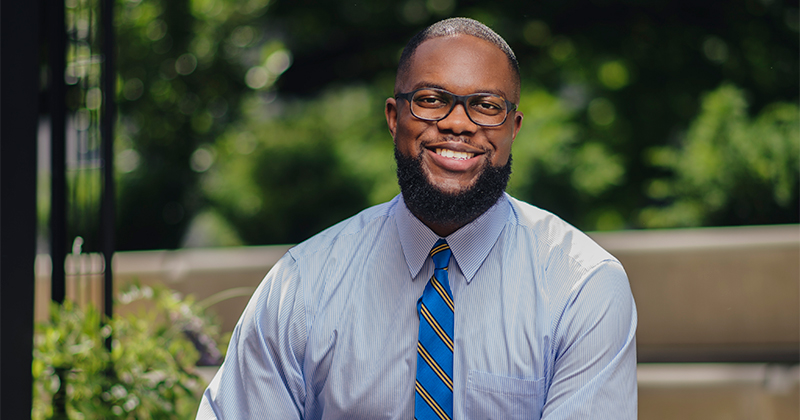Purdue public health professor sheds light on HIV disparities among Black populations through community-based research
Written By: Rebecca Hoffa, rhoffa@purdue.edu

Carlos Mahaffey(Photo provided)
According to HIV.gov, Black individuals accounted for 40% of new HIV diagnoses in the United States in 2021 while only accounting for 14% of the overall population. Carlos Mahaffey, assistant professor in the Purdue University Department of Public Health, said these disparities are further exacerbated when breaking down that segment, noting that Black men who have sex with men experience particularly high rates of HIV occurrence, which has been especially apparent in the South and Midwest regions of the United States.
Through a community-based research approach, Mahaffey is focused on reducing and raising awareness about these disparities.
“Long-term and overall, I want to reduce the HIV inequities that exist among Black men who have sex with men,” Mahaffey said. “That begins by looking at what we’ve done as a research community and what gaps still exist.”
Mahaffey joined Purdue’s College of Health and Human Sciences in 2022 from Oklahoma State University, which has allowed him to delve deeper into his research in the Sexual Health Research Lab by being closer to some of the populations he’s most interested in serving.
“Carlos’ work helps expand our understanding of the unique health needs of Black gay, bisexual and other men who have sex with men,” said Randolph Hubach, associate professor and head of the Department of Public Health. “This population remains a priority for HIV and STI prevention; however, fewer public health interventions have been tailored to the needs of these men. Recruiting Carlos to Purdue has allowed us to expand the reach of our sexual health initiatives within Indiana, particularly within those communities which remain underserved and under-resourced.”
What are you currently working on in your research?
Right now, I’m trying to understand: What are the sexual health needs of Black men who have sex with men? We talk a lot about health-seeking in general — mental health, physical health — but not specifically asking about the sexual health needs of Black men who have sex with men.
I’m currently looking in the Midwestern states at those men, asking them what their sexual health needs are. From there, I want to be able to work with the men themselves to develop components of an intervention they would actually use. We have a lot of research that talks about access to care and thinking about a lot of the issues that we run into: trying to find providers that look like us, that don’t have judgment or discrimination to the men who come in to seek care. With that in mind, I’m thinking about what type of approach we can do to get information to the men where they can access it and don’t have to think about, “Where am I going to go? Do I have to worry about stigma and who is going to see me?”
You previously looked at HIV in men with a history of involvement with the justice system. How did you become interested in your line of research, and how have you seen it evolve?
It’s something that I know impacts me, being a Black man in America, and impacts my community. It’s also not something that I heard people talk about much at the time, especially talking about people who were justice-involved. I met a mentor, and she talked about the research she was doing, and I thought it was fascinating. I’d never met someone who did research with justice-involved populations, especially going into the facilities. From there, things just developed. They were interests that I didn’t necessarily know I had until I realized, “I’m really enjoying what I’m doing,” and things just kind of developed from there.
What has your experience been joining the faculty as part of Purdue’s Public Health, Health Equity and Health Policy cluster hiring initiative?
I think one of the best benefits was being able to come in with a group of faculty who all had a common value system of wanting to make sure the work we do and promote is based around making sure health is the best it can be for everyone. We’re focusing on the equity part instead of just saying, “We need to provide the same level of everything to everyone.” There are some people who may not be able to benefit from everything, but we can use those resources for a community or a particular subset of the population who can. So, it’s nice having that and having them to lean on, talk to and network with and really think about what we can do as a cluster.
What is something for people to know about your work?
It’s really rooted in more than just health behaviors or individuals’ behaviors, but it’s based on a lot of the systems and policies that exist. It’s not just one thing; it’s a network of things that all interact with one another that lead to these inequities that we have. As much as I would love to solve the issue, it would take more than just me and more than just a team of researchers across the country. It would take people in different areas, from politicians to people in different industries outside of health who can implement changes within systems, to all work together to solve these issues.